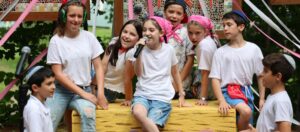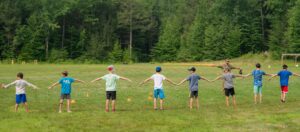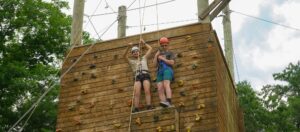Zichronot Shel Kayitz Ma’alot – Memories of my First Yavneh Summer
By Rabbi Ben Lanckton, K’84
Rabbi Ben Lanckton was ordained at the Jewish Theological Seminary (JTS) in 1996. He has served two Jewish Community Centers and two Hillels. Since August 2002 he has been the Jewish Spiritual Care Provider at Massachusetts General Hospital. His decision to go through with ordination was unduly influenced by the existence of the clergy pass to all regular season Boston Red Sox home games. He lives in Brookline with his awesome wife; they have two amazing adult children.
In late June 1983, I journeyed to Northwood, NH, for my Ma’alot summer at Camp Yavneh. I had just finished my freshman year in high school and my first year at the Prozdor of Hebrew College. I decided earlier that spring to join several of my Prozdor classmates at Yavneh, some of whom had been going there for years; it was my rookie summer. I knew to expect Hebrew, Jewish living, and some spirituality. My high expectations were happily exceeded, and in ways that lay the groundwork for living Jewishly in my family, and for the choice to become a rabbi.
The ease and comfort of the Hebrew idioms struck me with their elegance and functionality: “na le’ha-avir et ha“ for “please pass the” whatever food in the Hadar Ochel; instead of “I got it” calling “sheli” for a fly ball in the on the softball field; looking forward to “peulat erev,” which, while it just means “evening activity,” seemed more exotic using ancient word forms.
The rhythms of Jewish living awakened dormant connections to God, Torah, and Israel that had slumbered in my soul. I marveled at the message of two spaces for worship, traditional and egalitarian. My ease with this lived example of pluralism would later translate into my easy acceptance of two minyanim at JTS. The details of the parshiyot of Bamidbar, which I had never really read or certainly studied, enticed me with their combination of an all-too-human Am Yisrael and a Moshe Rabbeinu repeatedly called upon to plead on their behalf to a wonderfully sympathetic Kadosh Baruch Hu. The omnipresent songs, stories, and flag of the State of Israel deepened my connection to Zionism and sense of Ahavat Yisrael.
While they were not spiritual in any obvious way, from that summer, two memories stand out. The first one is a two-part sports memory. I was not athletic, but I did play on the softball team. The coach, Bruce Mael, put me in as a pinch hitter and to play first base, usually in the later innings (the timing of his decision may have been because the outcome was already decided). In the first six of the seven games, I batted exactly once in the game, and got a ground ball single through the infield every time. Bruce expressed his distress that despite my size (I was six feet at my Bar Mitzvah in 1981) I couldn’t hit for power. Yet I was leading the team in batting average (1.000) until the last game. To my dismay, in that last game, I hit it right to the shortstop, and couldn’t beat the throw, ruining my perfect season. But there’s a happy ending to the story. Near the end of the summer, I was in a Maccabiah softball game for my team, Zayit, with two on and two out. I hit the first pitch way over the head of the center fielder, who chased it in futile pursuit as I raced around the bases. As I headed for home, the Shofayt (umpire, but actually Judge in the Biblical text) – who happened to be my coach, Bruce – was screaming at me: “Why couldn’t you do that during the regular season?!”
The other memory is of musical theater. The show that summer was “The Sound of Music.” My longtime friend Charlie Savenor K’84 (who would later become a JTS classmate and fellow rabbi) was cast as Captain Von Tropp. I was cast as Rolf the boyfriend of the eldest Von Tropp girl, played by my friend Robin Bromberg K’84. Three things linger from that experience. One, I could not learn to waltz to save my life; we ended up abridging, and faking, the dance sequence. Two, I still remember the Hebrew for most of the song “I am Sixteen Going on Seventeen.” And last but not least, as Rolf joins the Nazi party near the end of the show, I think I am one of a very few campers in the world who have worn a swastika as an armband at a Jewish camp. The visceral reaction of many of the counselors to seeing me put it on at the dress rehearsal made a permanent impact on me of the enduring relevance of the memory of the Holocaust.
Those were only a few of the key moments of my Ma’alot year, and I haven’t even mentioned Kerem 1984 and Tzevet 1985. I realize that my mere three years at Yavneh pale by comparison to many campers, and counselors and leaders, who have spent a decade or more of summers at Machaneh Yavneh. But those three summers created so many happy associations with living Jewishly that the foundation of my life of Jewish celebration was firmly set. I did grow up in a loving Jewish household, and in an exceptionally creative synagogue community. But in those environments, I was not independent. Now, almost forty years later, I can see how Camp Yavneh sowed the seed of my adult Jewish identity. It came to fruition these many years later, in my roles of, in order of importance, a Jewish father, a Jewish husband, a Jewish son, and a Jewish Spiritual Care Provider.
This reflection also brings back fond memories of my late younger brother, Samuel Franklin Lanckton z”l, who also enjoyed many summers at Camp Yavneh. His first summer was my last, in 1985.




